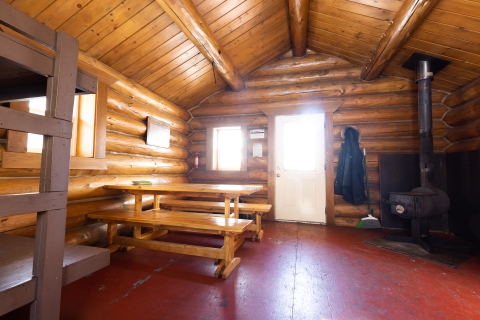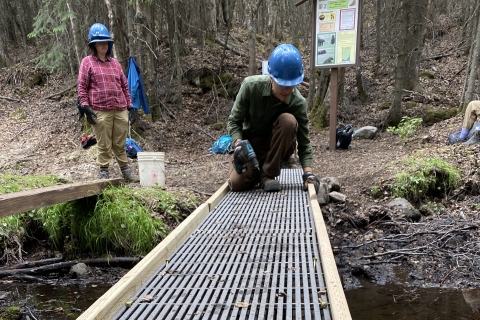Each year, hundreds of thousands of people from nearby communities and around the world visit and enjoy Alaska’s Kenai National Wildlife Refuge, from fishing or boating on the famous Kenai River, hiking through majestic scenery, or creating memories with family and friends while camping or staying in a public use cabin. We are committed to providing a safe, equitable, and quality experience for the people who love all that Kenai Refuge has to offer.
Announcement and Opportunity for Public Comment:
Proposed changes to Kenai Refuge recreation site fees for summer 2024
The U.S. Fish and Wildlife Service (Service) is proposing an increase to the overnight fees for front-country summer campground sites and public use cabins at Kenai National Wildlife Refuge. The fee increases would be in effect starting May 25, 2024, the first day of the Memorial Day weekend. This proposal includes an increase of $5 per night for campsites and $10 per night for cabins. Additionally, a loop of campsites at the Hidden Lake Campground will become reservation-only online and include a $10 reservation fee.
The proposed changes are necessary for Kenai Refuge to continue providing high-quality visitor services and programs to the local community and the hundreds of thousands of visitors who enjoy the refuge annually. All other refuge campgrounds that are not currently in the fee system will remain free.
Public engagement is an important part of the refuge's planning process. The Service invites public comment and questions on these proposed changes through October 20, 2023. Comments may be submitted by one of the following methods:
● Email kenai@fws.gov with the subject line: Proposed recreation fee changes;
● Hard copy by U.S. mail or hand delivery to: Kenai National Wildlife Refuge, Office of the Refuge Manager, P.O. Box 2139, Soldotna, AK 99669
Recreation sites with a proposed fee change
Hidden Lake Campground
Summer campground fees for all campsites would increase from $10 to $15 per night at Hidden Lake Campground.
The Skyview Loop (campsites 1-25) at Hidden Lake Campground would become reservation only and available to book online. A reservation fee of $10 per reservation will be charged for reserving these campsites in addition to the per night fee.
Upper Skilak Campground
Summer campground fees for drive-in campsites at the Upper Skilak Campground would increase from $10 to $15 per night.
Walk-in sites at the Upper Skilak Campground would increase from $5 to $10 per night.
Both campgrounds:
All campsites at the Upper Skilak Campground and at the Lake Loop (campsites 1-6) and Ridge Loop (campsites 1-12) portions of Hidden Lake Campground will remain first come first serve for visitors that have not reserved sites.
Public Use Cabins:
Refuge public use cabin rentals would increase from $35.00 to $45.00 per night for historic cabins, and $45.00 to $55.00 per night for contemporary cabins.
Historic cabins: Big Bay, Big Indian Creek, Caribou Lake, Doroshin Bay, Nurse’s, Pipe Creek, and Vogel Lake.
Contemporary cabins: Dolly Varden, Engineer Lake, Kelly Lake, McLain Lake, Pincher Creek, Snag Lake, Upper Ohmer Lake.
Frequently Asked Questions
Q. Why do you collect fees for some recreational sites on the refuge?
A. The Federal Lands Recreation Enhancement Act (FLREA) is legislation that allows federal public land agencies to collect amenity fees. This law allows refuges like Kenai to retain more than 80 percent of the fees collected for use on projects that directly enhance the experience of refuge visitors; the remaining 20% benefits the visitor facilities throughout the National Wildlife Refuge System. While basic refuge operations are funded by direct appropriations from Congress, the recreation use fees collected at the refuge are used to support new visitor service projects and the ongoing maintenance of refuge recreational facilities.
Q. Why are you proposing recreation fee increases?
A. The proposed fee increases are necessary for Kenai Refuge to maintain quality services for recreational users as public visitation and facility expenses increase. These fees have not changed in more than two decades, and this modest increase will ensure that visitors continue to enjoy well maintained campgrounds, cabins, trails, and other recreational amenities.
Q. How did the refuge decide on these fee increases?
A. These proposed campground and cabin fee increases are based on comparable fees for similar services in nearby campgrounds, with consideration to keep fees as low as possible while still meeting the needs for maintenance and recreation facility improvements. A cost comparison shows that even after the increases proposed, the refuge will continue to have the lowest fees compared to nearby campgrounds and federal cabin rental rates.
Q. Are there any proposed changes to campground sites that are not currently in the fee system? Is there a fee to enter the refuge?
A. No, all other refuge campgrounds that are not in the fee system will continue to be free on a first come basis. Kenai Refuge does not charge an entrance fee and has not proposed implementing one.
Q. What are examples of past projects funded by recreational fees at Kenai Refuge?
As a visitor to the refuge, you may have noticed some of these improvements, either partially or fully supported by recreational fees:
- Installation and maintenance of multiple vault toilets on the refuge and in campgrounds.
- Installation and maintenance of environmentally friendly composting toilets at refuge cabins.
- Hiking trail repairs and improvements: many hiking trail repair projects have been funded by recreation fee monies, such as repairing washed out sections of trail, the installation of bridges, and management of volunteer groups for trail projects.
- Bear management: campground fees help keep bears wild at Kenai Refuge, thanks in part to fee dollars! Refuge garbage cans, recycling bins and dumpsters are bear-resistant and contracted for timely disposal.
- Kenai Refuge has increased the number of campground hosts, volunteers and services to manage and improve the experience of our visitors. The volunteers assist in public outreach, guided hikes and messaging to improve food storage and reduce bear and human encounters.
- Recreation fees are used to employee summer internships that provide refuge information and environmental education programs for the public.
- Installation of light penetrating staircases and habitat improvement at the Russian River and Kenai River confluence.
- Planning and site improvements to Jim's Landing boat ramp on the Upper Kenai River have been partially supported by refuge recreation funds.





